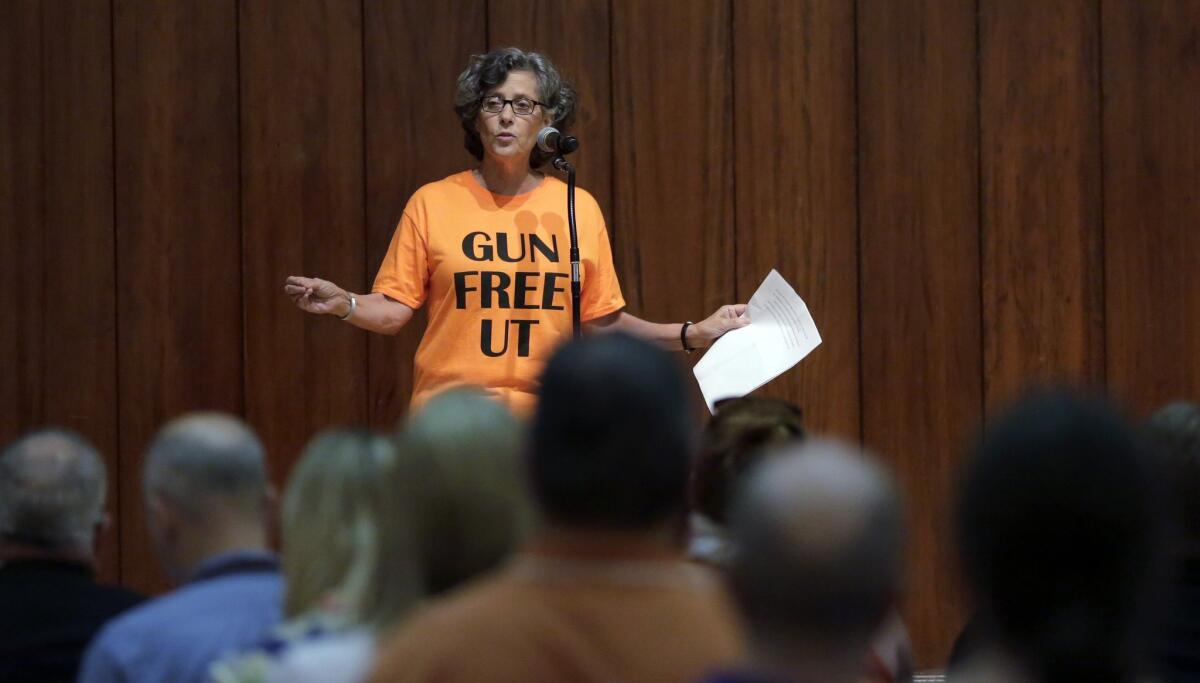Op-Ed: Like Prohibition, the fight over guns is about something else

Professor Joan Neuberger speaks at a public forum held on the University of Texas campus in Austin on Sept. 30.
A quarter-century ago, while casting about for a dissertation topic, I decided I wanted to write about alcohol prohibition. In a nation of so many drinkers, banning booze was obviously futile. So why did we try so hard to do it?
Then I encountered a book by a UC San Diego sociologist named Joseph Gusfield, who convinced me that Prohibition wasnât really aimed at ridding America of beer, wine and whiskey. It was instead a âSymbolic Crusadeâ â to borrow Gusfieldâs book title â by native-born Protestants, who seized on prohibition to affirm their historic dominance over immigrants and Roman Catholics.
Iâve been re-reading Gusfield in the wake of the Oct. 1 shooting at Umpqua Community College, which has sparked renewed controversy over guns on campus. A week after the Umpqua rampage, Gov. Jerry Brown signed a law barring concealed weapons from California campuses. Nineteen other states have passed similar measures, while 23 leave the matter up to individual schools, and eight explicitly allow so-called campus carry.
This controversy isnât really about guns, any more than Prohibition was about drink.
But this controversy isnât really about guns, any more than Prohibition was about drink. Itâs about different ways of seeing the world and â most of all â about who will gain the symbolic upper hand.
Consider Texas, which passed a law in June letting people bring guns into college buildings. They were already allowed to carry concealed weapons on campus, but the new law, which will go into effect next August, lets them pack heat in classrooms and offices as well.
Proponents say the new law will help people protect themselves from shooters like Charles Whitman, who climbed a University of Texas tower in 1966 and killed 16 people. In recent years, however, Texas campuses have been almost entirely free of gun violence. Of the 18,536 homicides in Texas between 2001 and 2013, only five â thatâs right, just five â occurred on or near college campuses.
So whatever the June law is about, it surely isnât about keeping Texasâ students, faculty and staff âsafeâ from gun attacks. But neither is it likely that the measure will make campuses less safe, which is what the other side keeps saying.
Their hero du jour is Daniel S. Hamermesh, an emeritus economics professor at University of Texas-Austin who resigned this month âout of self-protection,â as he wrote in a letter to university President Gregory Fenves.
Hamermesh said that the risk of getting shot by a âdisgruntled studentâ was âsubstantially enhancedâ by the new concealed-weapons law.
In a subsequent interview, Hamermesh said the law might also lead faculty to inflate student grades. âWho wants to give a student a bad grade if they are afraid theyâll shoot at you?â he asked.
âSubstantially enhancedâ? Grade inflation as a defense against homicide? Remember, students were already allowed to carry concealed weapons across UTâs verdant lawns. None of them shot a professor, and itâs hard to imagine how the new policy will make that more likely.
If this gunfight isnât really about safety â or, for that matter, about guns â whatâs going on? Why so much sound and fury over something that will make little or no practical difference?
The question brings us back to Gusfield, who reminded us that politics are a battle for symbolic as well as material advantage. Even if alcohol prohibition could never make America âdry,â it made its adherents feel as if the country was still theirs. Thatâs why they invested so much energy and emotion into passing the 18th Amendment.
Likewise, the concealed-weapons law allows its advocates to reclaim a kind of rough-hewn individualism that they think America has lost. They reason that if thereâs a problem with guns in our society, the solution is for everyone â including professor Hamermesh â to carry their own.
âGo get a gun yourself you dumb [expletive] and make sure your students know you have it,â one Internet scribe wrote, replying to Hamermeshâs fears of armed assailants. Another suggested that Hamermesh was actually âbeggingâ to be attacked by announcing to the world that âhe canât protect himself.â
Meanwhile, opponents of campus carry can seize the mantle of logic and science. And they get to cast their foes as simple-minded âgun nutsâ blinded by their passion for firearms and oblivious to the mayhem that these weapons have caused.
And letâs be clear: Guns do cause mayhem in America â just not on Texas campuses, where both sides have imagined a problem that simply does not exist. The real problem is in our minds and â especially â in the ways that we ridicule and denigrate one another. And the real goal isnât âsafetyâ but victory.
Jonathan Zimmerman teaches history and education at New York University. He is the author of âToo Hot to Handle: A Global History of Sex Education.â
Follow the Opinion section on Twitter @latimesopinion and Facebook
ALSO:
Does owning a gun make you safer?
Editorial: Congress to try again on gun control
Opinion: Guns and the gruesome price of freedom
More to Read
A cure for the common opinion
Get thought-provoking perspectives with our weekly newsletter.
You may occasionally receive promotional content from the Los Angeles Times.










